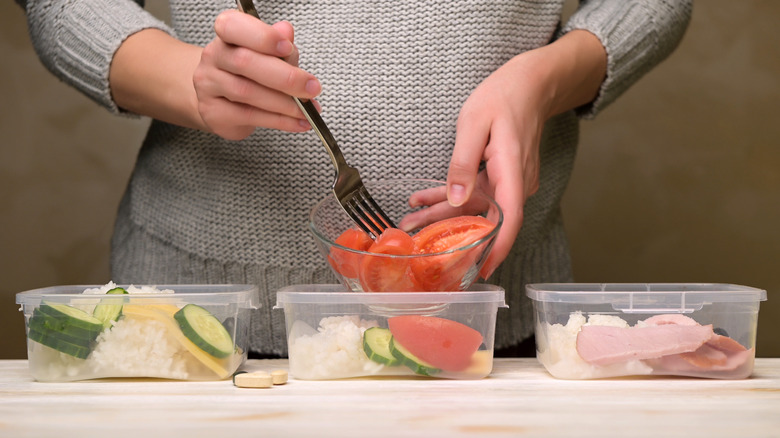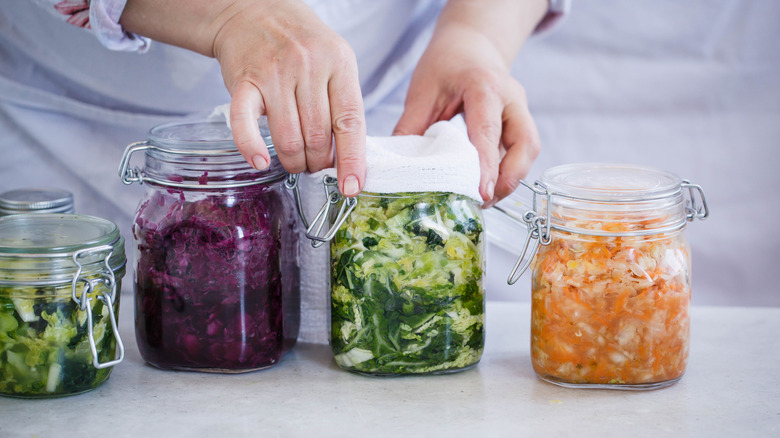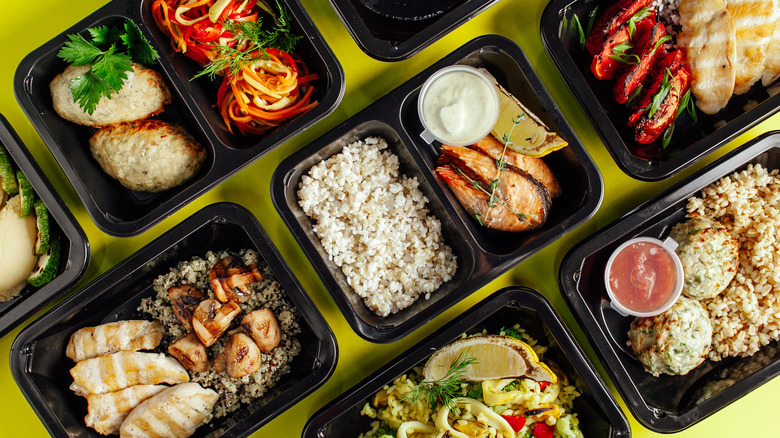The Biggest Mistakes You're Making When Meal Prepping
Meal prepping can be a great way to improve your diet, reduce food waste, and enjoy better health — all while saving time and money. Over time, you'll be better able to control your portions and avoid hidden calories. On top of that, you will get more comfortable in the kitchen and inspire your loved ones to make smarter food choices.
"With meal prep, you know exactly how many ounces of protein, vegetables, and carbs you are getting," explained registered dietician, Amy Shapiro, in an interview with Real Simple. She also notes that meal planning makes it easier to cut back on sugar, sodium, and excess saturated fat, which can help with weight loss and improve digestive health. A 2017 study published in the International Journal of Behavioral Nutrition and Physical Activity revealed people who planned their meals had a more varied diet and were less likely to become obese or overweight.
However, since there are no set rules when it comes to meal prep, you may not know where to start. Without a plan in place, it's easy to end up cooking too much food, forgetting about snacks, or getting stuck in a rut. Let's take a closer look at some of the most common meal prep mistakes and how to avoid them.
Overcomplicating the process
Meal prepping is supposed to make healthy eating easier and free up your time. Yet, we tend to overcomplicate things. For example, some people opt for elaborate recipes or spend hours calculating their macros and counting calories. These habits can create unnecessary stress, leading to feelings of frustration. The key to successful meal prep is to keep it simple, points out Oxygen.
For starters, make a list of foods or meals for the week and stick to it. Stock up on fruits, veggies, starches, and proteins. Don't forget about spices, herbs, flour, olive oil, and vinegar. Oxygen also recommends buying pre-chopped vegetables and canned foods to save time in the kitchen. Next, look for quick, simple recipes that fit your lifestyle. Tuna salad, chicken Marsala, baked salmon, grilled turkey breast, and other basic meals take minutes to prepare and don't require any special skills.
The whole point is to focus on easy-to-cook foods that store well. Grilled chicken breast can be used in dozens of recipes, from soups and casseroles to sandwiches. The same goes for brown or wild rice, quinoa, oats, and other grains. Leafy green vegetables have a short lifespan, but some can last for a week or longer when stored properly. Iceberg lettuce, for instance, has a shelf life of seven to 10 days, according to EatByDate. Therefore, it's a better choice than butter lettuce, which only lasts for three to five days.
Making the same meals every week
While it's important to keep things simple, you shouldn't eat the same things day in and day out. With this approach, you could be missing out on important nutrients and get stuck in a rut. "If you only eat orange vegetables, like carrots and sweet potatoes, you will be getting a good amount of fiber, vitamin A and vitamin C, but you will be missing out on vitamin K, folate and lutein found in dark green vegetables like kale or broccoli," explains registered dietician Kate McGowan (via NBC News). Moreover, eating the same foods every day can affect the gut microbiome, according to a 2016 study published in Molecular Metabolism.
To prevent these issues, determine how many meals and snacks you want daily. Next, try to estimate the amount of protein, carbs, and fats in each meal and then see if it meets your nutritional needs for the day. Use a variety of seasonal foods in your recipes and opt for different sources of protein, healthy fats, and carbohydrates. For example, you could alternate between poultry, legumes, and fish to vary your protein choices. "As long as you're mixing up the ingredients you use each week, you're eating a variety of nutrients over time. After all, our health is the average of our choices over time," dietician Chelsey Amer told NBC News.
Trying to prep all of your meals at once
Contrary to popular belief, there's no need to prepare all of your meals for the week at once. This approach can free up your time, but it requires a lot of planning. Plus, your meals won't taste the same by the end of the week, especially if you opt for perishable ingredients. Some foods, such as cooked rice, only last for three or four days in the fridge, notes Healthline. Cooked beans, lentils, and other legumes have a short lifespan, too. Ideally, try to prepare your meals twice a week, such as every Monday and Thursday, to prevent food spoilage and enjoy more flexibility.
Speaking of food safety, remember to label your food with the date it was cooked, recommend the experts at Vital Record. Most food products can be refrigerated for up to four days or frozen for three to four months. Generally, it's best to use smaller containers so you can defrost individual meals or ingredients as needed. Opt for microwave-safe containers and use a food scale to measure your portions before storing them in the refrigerator or freezer.
All in all, meal prep doesn't have to be complicated or time-consuming. Stick to simple recipes, use a variety of ingredients, and be realistic about what you eat in a given week. As far as snacking goes, your best bet is to opt for nuts and seeds, dried fruit, whole rice cakes, protein bars, and other non-perishable foods.




